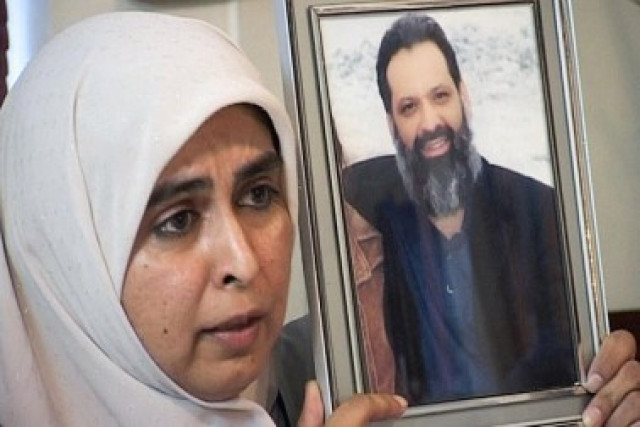Prepare policy on missing-persons: SC orders Federal Govt
Court directs a senior official to file the government's policy statement on missing persons.

Masood Janjua went missing in 2004 from Rawalpindi and since then, there had been no clue about his whereabouts. The only hope brought in for his wife Amina was the statement given by Imran Munir in 2009, that he saw Janjua in the custody of Brigadier Saeed. PHOTO: FILE.
“It is the responsibility of the state under article 9 of the constitution to protect the life and liberty of its citizens," noted a three-judge SC bench headed by Chief Justice Iftikhar Muhammad Chaudhry as it heard a case on the disappearance of Fazal-e-Rabbi, whose father Khanzada had filed an application with the SC.
Rabi allegedly went missing on June 10 2009 when he was crossing a army picket in the troubled area of FATA..
The Chief Justice said that the court had ordered a "summary of all cases related to enforced disappearances to ascertain the progress in the case and the policy of the government to affect the recovery of missing persons.”
The bench, which also included Justice Jawwad S Khawaja and Justice Sheikh Azmat Saeed, listed all the missing persons cases pending in the SC with its Human Rights Cell and with the respective provincial high courts.
While hearing cases of different enforced disappearances, the panel directed the attorney general of Pakistan to submit a detailed policy of the federal government on how it plans to deal with the miseries of victims' families.
“The court at the apex level continues to take up the issue and work towards recovery of the missing persons. We asked the AG to point out the policy of the government that what measure it would take to ensure that no person is subjected to enforced disappearances.”
They added that anyone found involved in anti-state activities should be put up for trial in the competent court of law.
At this, the Director General Crisis Management Cell of Interior Ministry Tariq Lodhi presented a document as the government's official policy on the matter.
The Chief Justice observed that the policy statement of the federal government should be filed by a senior official of the government or the AG, and rejected the forwarded document.
The Masood Janjua case
The court also conducted a hearing on the case of Masood Janjua's disappearance.
Masood Janjua went missing in 2004 from Rawalpindi and since then, there had been no clue about his whereabouts. The only hope brought in for his wife Amina was the statement given by Imran Munir in 2009, that he saw Janjua in the custody of Brigadier Saeed.
Additional Attorney General Tariq Khokhar told the bench that Dr Imran Munir had informed a JIT that he had seen the abducted in an internment center of Brigadier Saeed, situated at Zakaria Mosque Westridge, Rawalpindi.
The Superintendent of Police of Potohar Division, Haroon Joya, then informed the court that the police had obtained warrants for the arrest of Brigadier Mansoor Saeed of ISI from the court of Irfan Naseem Tarar, Civil Judge Rawalpindi, for allegedly keeping certain individuals in unlawful custody.
The Chief Justice cautioned the police to proceed with extra care in this matter.
Earlier, the court had urged the police to register cases against all those persons who were being named by the relatives of the missing persons for their alleged roles in the disappearances.
Tausif Ali case
In yet another case the bench directed Rawalpindi police to continue its search for Tausif Ali. Ali's wife Abida Malik had alleged that Major Haider of MI took away her husband last year, after which she never heard from him again.
Station House Officer (SHO) Sadiqabad Police Station Inspector Malik Allahyar informed the court that his predecessor had registered a criminal case against Major Haider and even went to the MI’s office in Mirpur to question him, only to be told that the major was not with the MI.
The father-in-law of Tausif Ali informed the court that he had personally met the accused. He said that the Major used to deal in timber with Tausif and had gotten annoyed over a business dispute.
Commenting on the case, Chief Justice Iftikhar Chaudhry observed that it seemed the case would have to be dealt with as a missing-individual case since institutional involvement had to be ruled out.
He was responding to the plea of advocate Ibrahim Satti, who represented the MI and plead that no criminal cases could be registered against military personnel, as they were subject to Pakistan Army Act of 1952.
Satti said there had been numerous judgments from the apex court, which had already ruled that no court or police could take cognizance against army personnel.
The bench, adjourning the hearing of these cases till July 31, asked the lawyer to get instructions from Secretary of Ministry of Defence about whether the case of Major Haider involved the individual or the department.



















COMMENTS
Comments are moderated and generally will be posted if they are on-topic and not abusive.
For more information, please see our Comments FAQ